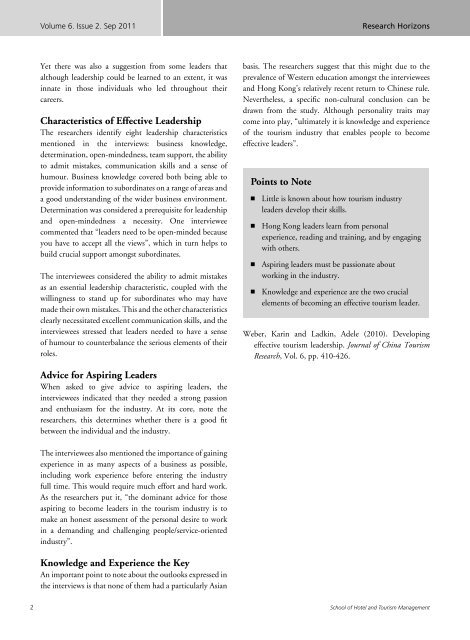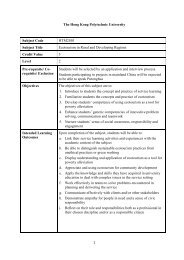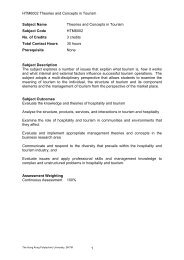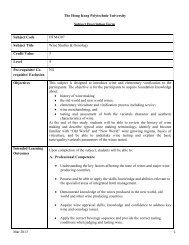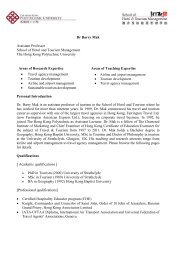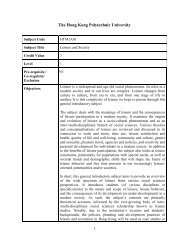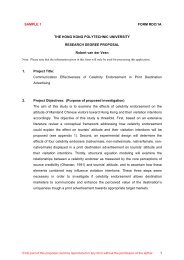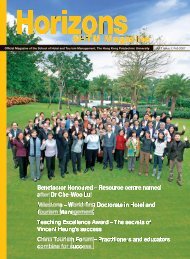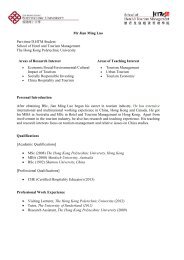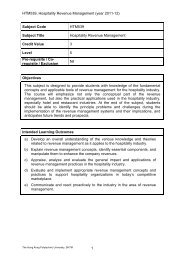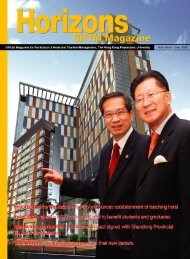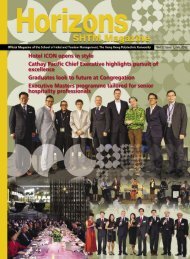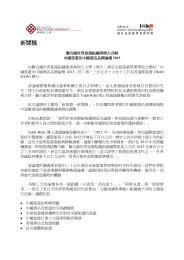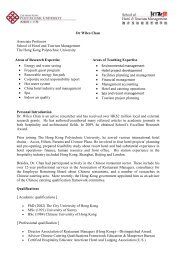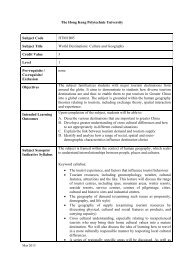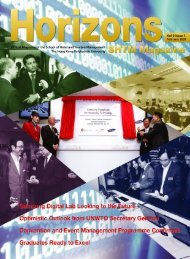<strong>Vol</strong>ume 6. <strong>Issue</strong> 2. Sep 20<strong>11</strong>Research HorizonsYet there was also a suggestion from some leaders thatalthough leadership could be learned to an extent, it wasinnate in those individuals who led throughout theircareers.Characteristics <strong>of</strong> Effective LeadershipThe researchers identify eight leadership characteristicsmentioned in the interviews: business knowledge,determination, open-mindedness, team support, the abilityto admit mistakes, communication skills and a sense <strong>of</strong>humour. Business knowledge covered both being able toprovide information to subordinates on a range <strong>of</strong> areas anda good understanding <strong>of</strong> the wider business environment.Determination was considered a prerequisite for leadershipand open-mindedness a necessity. One intervieweecommented that “leaders need to be open-minded becauseyou have to accept all the views”, which in turn helps tobuild crucial support amongst subordinates.The interviewees considered the ability to admit mistakesas an essential leadership characteristic, coupled with thewillingness to stand up for subordinates who may havemade their own mistakes. This and the other characteristicsclearly necessitated excellent communication skills, and theinterviewees stressed that leaders needed to have a sense<strong>of</strong> humour to counterbalance the serious elements <strong>of</strong> theirroles.basis. The researchers suggest that this might due to theprevalence <strong>of</strong> Western education amongst the intervieweesand Hong Kong’s relatively recent return to Chinese rule.Nevertheless, a specific non-cultural conclusion can bedrawn from the study. Although personality traits maycome into play, “ultimately it is knowledge and experience<strong>of</strong> the tourism industry that enables people to becomeeffective leaders”.Points to Note■ Little is known about how tourism industryleaders develop their skills.■ Hong Kong leaders learn from personalexperience, reading and training, and by engagingwith others.■ Aspiring leaders must be passionate aboutworking in the industry.■ Knowledge and experience are the two crucialelements <strong>of</strong> becoming an effective tourism leader.Weber, Karin and Ladkin, Adele (2010). Developingeffective tourism leadership. Journal <strong>of</strong> China <strong>Tourism</strong>Research, <strong>Vol</strong>. 6, pp. 410-426.Advice for Aspiring LeadersWhen asked to give advice to aspiring leaders, theinterviewees indicated that they needed a strong passionand enthusiasm for the industry. At its core, note theresearchers, this determines whether there is a good fitbetween the individual and the industry.The interviewees also mentioned the importance <strong>of</strong> gainingexperience in as many aspects <strong>of</strong> a business as possible,including work experience before entering the industryfull time. This would require much effort and hard work.As the researchers put it, “the dominant advice for thoseaspiring to become leaders in the tourism industry is tomake an honest assessment <strong>of</strong> the personal desire to workin a demanding and challenging people/service-orientedindustry”.Knowledge and Experience the KeyAn important point to note about the outlooks expressed inthe interviews is that none <strong>of</strong> them had a particularly Asian2<strong>School</strong> <strong>of</strong> <strong>Hotel</strong> and <strong>Tourism</strong> Management
Research Horizons <strong>Vol</strong>ume 6. <strong>Issue</strong> 2. Sep 20<strong>11</strong>Understanding Work-Family <strong>Issue</strong>s Key toCompetitive Advantage for <strong>Hotel</strong>s<strong>Hotel</strong>s seeking to develop a competitive advantage throughtheir deployment <strong>of</strong> human resources should focus on onecritical issue argue the SHTM’s Qu Xiao and a co-authorin a recently published research paper. By investigatinghotel general managers’ perceptions <strong>of</strong> strategic issuesrelated to human resources, the researchers develop aframework for understanding the importance <strong>of</strong> work-lifebalance to a hotel’s success. Although drawn from the UShotel industry, their findings have significant implicationsfor hoteliers around the world.Strategic Management and Work-FamilyPracticesStrategic management is critical to any organisation’ssuccess and involves executives scanning the operatingenvironment, identifying strategic issues, formulatingresponses and enacting appropriate strategies. Theirperceptions <strong>of</strong> what makes an issue strategic are affectedby factors ranging from the type <strong>of</strong> organisation in whichthey work to their own employment background. Yet theycan usually be expected to identify issues that “includeexternal opportunities and threats, and when linked withorganisational strengths, lead to strategic advantage for thefirm”.Amongst the issues that have the potential to provide hotelsin particular with a sustainable competitive advantageare the ways in which human resources are handled anddeployed. The researchers note that successful humanresource management can help to develop hotel-specificcompetencies, produce “complex social relations” andgenerate tacit organisational knowledge.However, some current human resource practices curtailthese outcomes. The researchers comment that hotels<strong>of</strong>ten “encourage employees to work as many hours aspossible, including weekends and holidays”. There is alsoa predominance <strong>of</strong> shift work, rotating schedules andweekend work, coupled with the notion <strong>of</strong> ‘face time’ –whereby employees are expected to “be physically presentat virtually all times”, even when not needed.The researchers argue that changing to a more familyfriendly culture could enable a hotel to “gain a competitiveadvantage through reduced absenteeism, reduced turnoverand superior retention and productivity <strong>of</strong> employees”.In other words, family friendly practices could havestrategic value. They thus set out to discern how hotelgeneral managers (GMs) identify work-family issues ascomponents <strong>of</strong> their strategic issue perceptions, and howtheir organisational cultures relate to the work-life issuesthat concern them.General Managers InterviewedTo achieve those aims, the researchers conducted faceto-faceinterviews with the GMs <strong>of</strong> 49 full-service hotelsacross the United States as part <strong>of</strong> a larger research projecton work-family issues at all levels <strong>of</strong> the hotel industry.Full service hotels were the focus because their GMs haveboth strategic responsibilities and multiple managersreporting to them. The hotel sizes ranged between 218and 2,000 guest rooms, and employee numbers between105 and 1,200.Of the interviewed managers, 45 were male and theirages ranged between 37 and 62 years. The intervieweeshad from 13 to 45 years <strong>of</strong> experience in the hotelindustry, including up to 25 years as GM. All but three<strong>of</strong> the interviewees worked for major international hotelcompanies.Themes IdentifiedIn analysing the interviewees’ responses to questionsaddressing strategic considerations, human resource issuesand personal advancement, the researchers identify anumber <strong>of</strong> major themes. These include opportunities,threats, competitive advantages, management style,personality, the existence <strong>of</strong> mentors, experience,organisational culture, workplace flexibility, communication<strong>of</strong> best practices, use <strong>of</strong> technology, career considerations,family life and turnover.<strong>School</strong> <strong>of</strong> <strong>Hotel</strong> and <strong>Tourism</strong> Management 3


